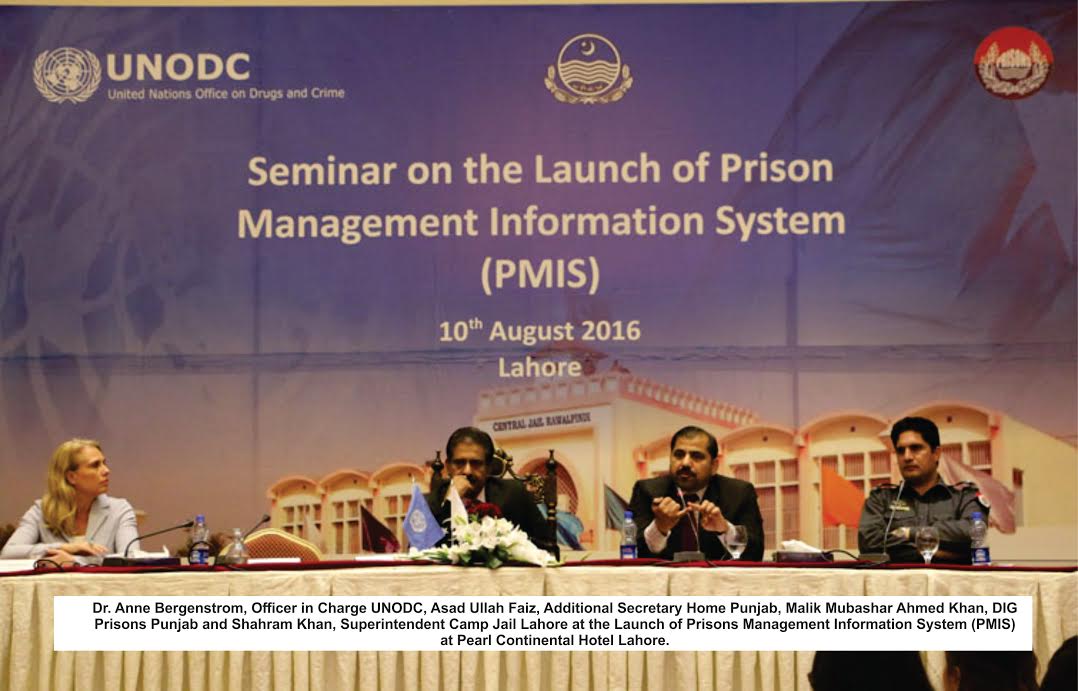LAHORE ( HAFEEZ REPORT )
The number of prisoners are increasing due to the increased crime rate, present security challenges, and burgeoning population in Pakistan. The current issues in prison administration are over crowding, the mixing of high- and low-risk prisoners, obsolete legislation and rules/operating procedures, the lack of any electronic record-keeping system, and lack of prison staff training and capacity building. For this the United Nations Office on Drugs and Crime (UNODC) in Pakistan, in collaboration with the Punjab Prisons Department, has designed a Prison Management Information System to computerize and automate prisoner related matters and day to day operations in the province’s prisons.
UNODC today hosted a Seminar at the launch of PMIS in 20 prisons of Punjab, where stakeholders from the international community (donors), representatives from civil society, and government officials were present; and were given the opportunity to learn about the new computerized automation system.
PMIS is designed to facilitate the prisons’ administration in operations such as Admission and Release, FIR, Under Sections and Warrants’ Administration, Prisoners’ Housing Management, Daily Court Production Management, Court Decisions and Sentence Management, Remission Management, Appeal Management for Convicted Prisoners, Management of Medical Treatment, Visitors’ Management, and other miscellaneous subjects viz. Prison Offense Management, Cash Ledger, Belongings’ Management, Children’s Log, etc. The system also includes a Reporting Module for facilitating the several reports specified for presentation and utilization at different levels. UNODC is in addition providing the Punjab Prisons Department with the necessary PMIS-related equipment including computers, biometric systems, networking, etc.
Initially the system is being installed in 20 prisons across Punjab. The system was piloted at Camp Jail, Lahore and was replicated in 19 prisons throughout the province. Apart from this, basic training on PMIS is being conducted for prisons officials at the National Academy for Prisons Management (NAPA), towards better understanding and implementing the system in their respective prisons. Training sessions on PMIS were also conducted for senior prisons officials of NAPA.
Addressing the participants Ms. Anne Bergenstrom, Officer in Charge UNODC, thanked Mr. Azam Suleiman Khan, Home Secretary Punjab, Mr. Shoaib Akbar, Special Secretary (Home), Mian Farooq Nazir, Inspector General Prisons, Mr. Asad Ullah Faiz, Additional Secretary (Home), and all participants from the Government of Punjab and the international community for supporting the important initiative of implementing the Prison Management Information System in Punjab. Ms. Bergenstrom also said it was now time, in fact the need of the hour, to move forward towards digitalization of prisons’ data. The Officer in Charge then apprised the participants of the actual steps UNODC had taken for the capacity building of the Punjab Prisons Department:-
§ Over 17 training sessions delivered to lower, mid- and upper-rank prison officials, on 17 specialized modules
§ Training of Trainers (ToT) courses held for prisons officials
§ The institution of PMIS in 20 prisons of the province
§ Draft Prisons Rules for Punjab drawn up
To conclude, she assured the attendees of UNODC’s continued support in enhancing the capacity of the Prisons Department; and acknowledged with thanks the generous support therein of the Kingdom of Denmark and the Bureau of International Narcotics and Law Enforcement Affairs (INL) USA.

